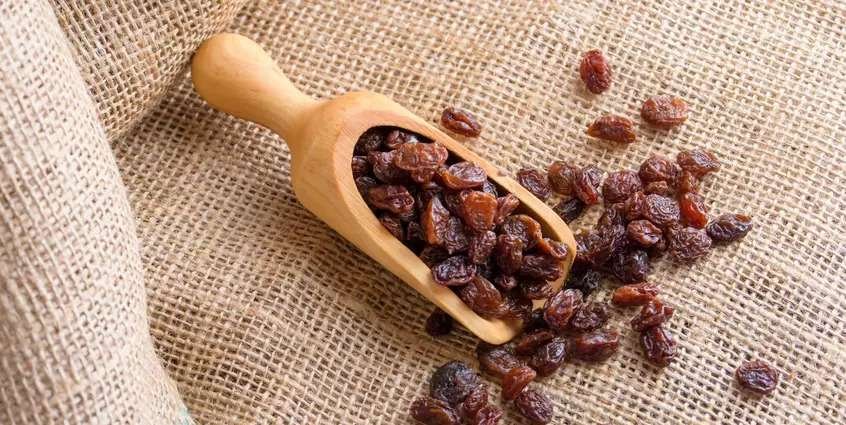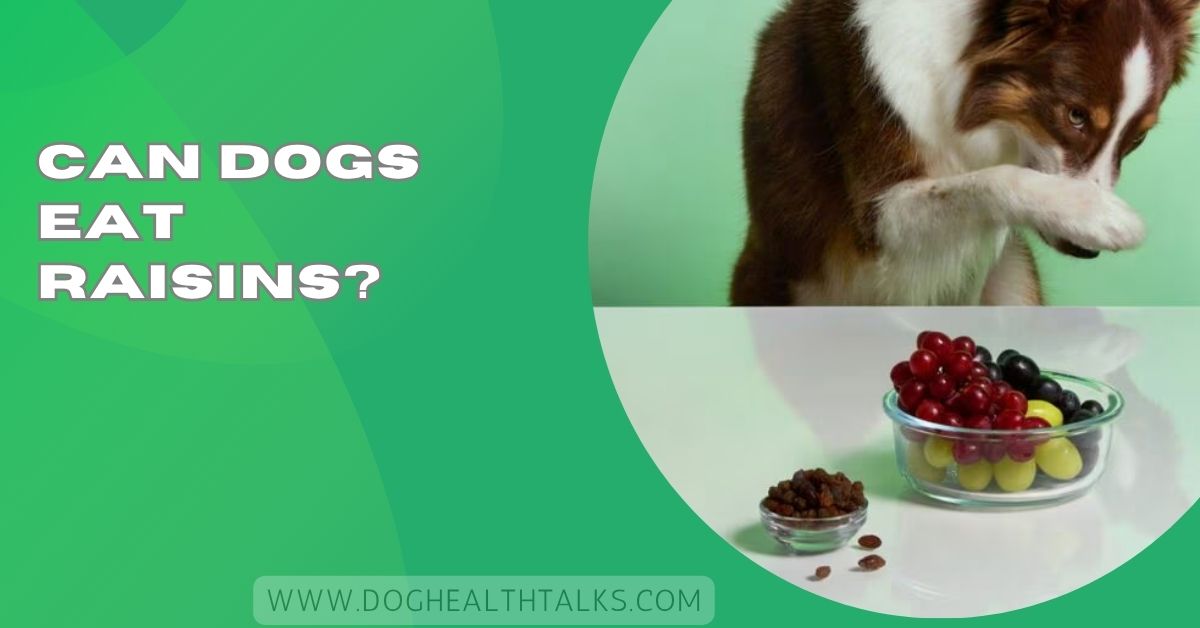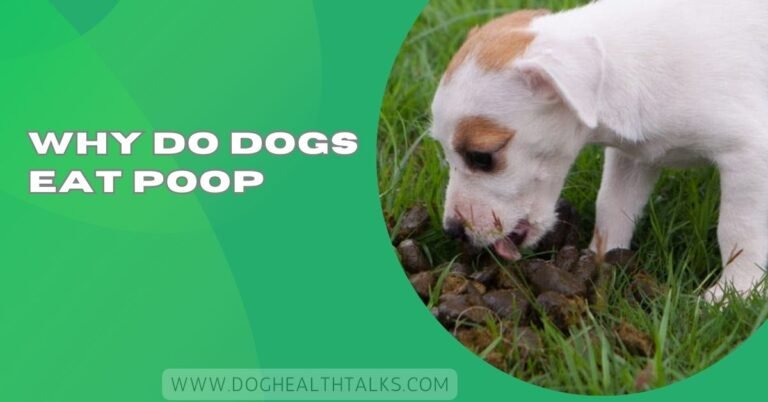Can Dogs Eat Raisins?: How to Act Fast and Save Their Life
Raisins may seem like a harmless, healthy snack for humans, but for dogs, they can be dangerously toxic.
No, dogs should never eat raisins. Raisins, grapes, and currants are extremely toxic to dogs and can cause serious health problems, including sudden kidney failure. Always keep these fruits far from your dog’s reach.
That’s why it’s so important to know the facts, stay cautious, and keep raisins completely away from your furry friend to ensure their long, happy life.
Why Are Raisins Bad For Dogs?
Raisins are bad for dogs because they contain a substance that can seriously harm their kidneys. Even a small number of raisins can make a dog very sick.
Some dogs may start vomiting, lose energy, or stop eating soon after eating raisins. In severe cases, raisins can cause kidney failure, which can be life-threatening.
What makes them especially dangerous is that no one knows exactly how much is toxic — and each dog reacts differently. That’s why it’s safest to never give your dog raisins or foods made with them. Always keep raisins and grapes far out of reach.
Signs Of Raisin Toxicity In Dogs

The symptoms of raisin poisoning don’t always show up immediately. In most cases, they appear within 12–24 hours after ingestion, but sometimes can take longer depending on your dog’s health, size, and how much they ate.
Early symptoms include:
- Vomiting or diarrhea (often with pieces of raisins visible)
- Loss of appetite
- Excessive thirst or increased urination
- Lethargy or unusual quietness
- Dehydration (skin doesn’t return to normal when gently pinched)
Advanced symptoms (after 24–48 hours):
- Reduced or no urination (a sign of kidney failure)
- Bad breath or ammonia-like odor
- Weakness and tremors
- Abdominal pain or discomfort
- Severe dehydration and loss of coordination
Even if your dog only shows mild signs, don’t wait. Early veterinary care can make all the difference between recovery and severe kidney damage.
Also Read: Can Dogs Eat Pita Chips?: Vet-Approved Guide for Pet Parents
My Dog Ate Raisins—What Do I Do?
If your dog has eaten raisins, it’s an emergency — even if it’s just one raisin. Here’s exactly what you should do:
- Call your veterinarian immediately. Tell them your dog’s size, breed, and how many raisins (or raisin-containing foods) they might have eaten.
- Contact the Pet Poison Helpline at 855-764-7661 if your vet is unavailable. This service can guide you on what to do next while you’re on the way to the clinic.
- Do not induce vomiting unless instructed by a vet. In some cases (for example, if the dog is unconscious or struggling to breathe), inducing vomiting can make the situation worse.
- Bring packaging or evidence of the food. This helps the vet estimate how much toxin your dog might have consumed.
- Act fast. The sooner your dog receives treatment, the better the chances of a full recovery. Delaying even a few hours can increase the risk of kidney failure.
1. How Vets Treat Dogs Who Ate Raisins
When you arrive at the vet’s office, treatment will begin immediately. The goal is to flush the toxin out and protect your dog’s kidneys from damage.
Typical steps include:
- Inducing vomiting: If the raisins were eaten recently (within 1–2 hours), the vet may safely make your dog vomit.
- Activated charcoal: Helps absorb remaining toxins in the stomach and intestines.
- IV fluids (Intravenous therapy): The most important step. This helps maintain kidney function and flush the toxins out of the bloodstream.
- Bloodwork and urine monitoring: Vets track your dog’s kidney enzyme levels to watch for signs of damage.
- Hospitalization: Most dogs will stay under observation for 24–48 hours.
With immediate treatment, many dogs recover fully. But waiting too long can cause irreversible kidney failure.
So, even if your dog seems “fine” after eating raisins — don’t take any chances. Go to the vet right away.
Why Raisin Toxicity Happens

Despite years of research, experts still don’t fully understand why raisins (and grapes) are toxic to dogs. One leading theory points to tartaric acid, a natural substance found in grapes and raisins that dogs can’t metabolize efficiently.
What’s especially concerning is that toxicity doesn’t depend on:
- The amount eaten
- The type of grape or raisin
- Whether it’s organic, seedless, or peeled
- Or even if it’s cooked, juiced, or baked
Every dog’s body reacts differently — one may eat several raisins and show no symptoms, while another may eat just one and experience kidney failure.
This unpredictability is what makes raisin toxicity so dangerous. That’s why veterinarians agree: it’s best to avoid raisins completely.
Read More: Can Dogs Eat Taro? – Don’t Miss This Expert Advice!
Preventing Future Raisin Incidents
Prevention is always easier (and safer) than treatment. Here’s how you can protect your furry friend from accidental raisin poisoning:
- Keep raisins and grape products out of reach. Store them in high cabinets or containers your dog can’t access.
- Educate your family and guests. Make sure everyone knows not to feed raisins, grapes, or related foods to your dog — even as a treat.
- Read ingredient labels carefully. Many snacks and baked goods contain hidden raisins (like trail mix, cereals, and granola bars).
- Use dog-safe alternatives. Reward your dog with vet-approved treats or fruits like apple slices, blueberries, or banana chunks.
- Be cautious on walks or hikes. Dogs might find raisins or grapes that have fallen from picnic tables or vines. Always keep them leashed and supervised outdoors.
Remember, a single mistake can have lasting effects — so a little prevention goes a long way.
How Many Raisins Are Dangerous For My Dog?
There’s no “safe” number of raisins for dogs. Toxicity can occur with even one or two raisins in small dogs, and slightly larger amounts in bigger breeds.
Veterinary studies have shown that as few as 0.1 ounces per 2 pounds of body weight can cause problems. But because reactions vary so much between individual dogs, it’s impossible to predict who will be affected.
What Should I Do If My Dog Ate Raisins?
If your dog eats raisins — whether it’s one raisin or a handful of raisin bread — take immediate action:
- Step 1: Call your vet or emergency clinic right away.
- Step 2: Note the time and amount your dog may have eaten.
- Step 3: Don’t wait for symptoms — toxicity can begin silently.
- Step 4: Follow your vet’s advice exactly. They may instruct you to come in immediately or induce vomiting if safe.
Your dog’s life could depend on how fast you respond. Remember, the earlier the treatment begins, the higher the success rate for a full recovery.
My Dog Ate 3 Raisins
Even three raisins can be dangerous for a dog. Every dog reacts differently, and even small amounts may cause kidney damage.
Don’t wait to see if your dog gets sick—call your vet or the Pet Poison Helpline right away. Quick action gives your pet the best chance to recover.
My Dog Ate Raisins, But Seems Fine
Even if your dog looks fine after eating raisins, toxins could still be harming the kidneys silently. Symptoms often appear later, within 12–24 hours.
Call your vet immediately and explain what happened. Early treatment can prevent serious illness and may save your dog’s life. Don’t take any chances.
Can 1 Raisin Kill A Dog
Yes, even one raisin can be deadly for some dogs. Toxicity doesn’t depend on the dog’s size or breed—it’s unpredictable.
Some dogs show no signs, while others can suffer kidney failure from just one piece. Always treat any raisin ingestion as an emergency and contact your vet right away.
How Many Raisins Are Toxic To Dogs
There’s no safe number of raisins for dogs. Some dogs get sick from just one or two, while others might handle more—but you can never know which.
Because reactions differ, veterinarians agree that any amount of raisins is unsafe. Always keep them far from your dog’s reach to stay safe.
Must Read: Is Fabuloso Safe For Dogs? – Safety Tips for Pet Parents!
My Dog Ate Raisins 24 Hours Ago
If your dog ate raisins 24 hours ago, go to the vet immediately—even if there are no symptoms. Toxins may already be damaging the kidneys.
Delaying care can make things worse. A vet can run tests and give fluids to help flush out toxins. Time really matters here.
How Many Raisins Can A Dog Eat
None. Dogs should never eat raisins—there’s no safe amount. Even one or two can trigger vomiting, diarrhea, and kidney failure.
Every dog’s body reacts differently, so it’s impossible to predict. Always avoid giving raisins or foods that contain them, and keep them stored safely out of your dog’s reach.
My Dog Ate One Raisin
One raisin might seem tiny, but it can cause serious harm to your dog. Some dogs develop kidney failure from just a single raisin.
Don’t wait for symptoms—call your vet right away. They’ll tell you what to do next. Acting quickly can make all the difference for your dog’s health.
My Dog Ate Raisins And Died
Losing a pet in this manner is heartbreaking, and it highlights the true danger of raisins. Even small amounts can cause kidney failure that leads to death. If this happened to your dog, please don’t blame yourself—many owners are unaware that raisins are toxic. Share your story to help others protect theirs.
FAQs
Can Dogs Eat Raisins Safely?
No, dogs can’t eat raisins safely. Even one raisin can harm their kidneys. Always keep raisins away and choose dog-safe treats instead.
What Happens If A Dog Eats Raisins?
Raisins can poison dogs, causing vomiting, diarrhea, and kidney failure. Seek immediate help from your veterinarian, even if your dog appears to be completely fine at the moment.
What Happens If A Dog Eats A Piece Of Raisin Bread?
Even one slice of raisin bread can be dangerous. Baked raisins still contain toxins harmful to dogs. Contact your vet right away for help.
How Many Raisins Can A 50 Lb Dog Eat?
None. Even a few raisins can cause kidney damage in a 50-pound dog. Every dog reacts differently, so it’s safest to avoid them completely.
How Long Do Raisins Take To Affect A Dog?
Raisins usually start affecting dogs within 12 to 24 hours. Early signs include vomiting, tiredness, and loss of appetite. Call your vet immediately.
What Home Remedy Can I Give My Dog Who Ate Grapes?
Don’t try home remedies. Grapes and raisins are emergencies. Contact your veterinarian or the Pet Poison Helpline immediately for safe, professional advice and treatment.
How Long Does It Take For A Dog To Show Signs Of Poisoning?
Most dogs show poisoning signs within 12 to 24 hours. Vomiting, diarrhea, and weakness are common. Get your dog medical help as soon as possible.
What If My 70 Pound Dog Ate 10 Grapes?
Ten grapes could still be dangerous for a 70-pound dog. Call your vet right away. Quick treatment can prevent kidney failure and save your dog’s life.
How Much Does It Cost To Treat Raisin Poisoning In Dogs?
Treatment costs can range from $300 to over $2,000, depending on the severity of the condition. It’s expensive, but early treatment greatly increases your dog’s chance of recovery.
How Many Raisins Is 1 Oz?
One ounce of raisins equals about 60 small raisins. That tiny amount could be deadly for some dogs, so always keep raisins out of reach.
Conclusion
Raisins may be healthy for humans, but they’re highly toxic to dogs. Even a single raisin can cause serious kidney damage or death. Always keep raisins, grapes, and foods containing them far from your dog’s reach. If your pet ever eats raisins, contact your vet immediately. Quick action can save your dog’s life. Stay alert, stay informed, and protect your furry friend from this hidden danger.






